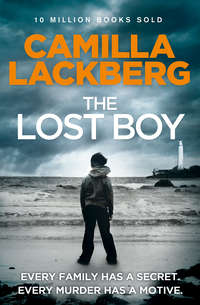
Полная версия
The Hidden Child
‘You make it sound as if I’m going to be off sailing the seven seas,’ said Erica with a laugh. ‘But I’ll be coming downstairs for lunch.’
‘Do you think this will work out, you staying in the house to work?’
‘We can at least give it a try. Just pretend I’m not here.’
‘No problem. As soon as you close the door to your workroom, you no longer exist for me.’ Patrik gave her a wink.
‘Hmm. Well, we’ll see,’ replied Erica and headed upstairs. ‘But it’ll be worth it if I can avoid having to rent office space.’
She went into her workroom and closed the door with mixed feelings. In the twelve months she’d been at home taking care of Maja, she’d found herself longing for the day she could pass the baton to Patrik and devote herself to grown-up matters again. She’d grown sick and tired of playgrounds, sandboxes, and children’s TV programmes. Making the perfect sand pie didn’t exactly qualify as intellectual stimulation, and no matter how much she loved her daughter if she was forced to sing ‘Itsy-bitsy Spider’ one more time she’d go crazy. Now it was Patrik’s turn to look after the child.
With a certain feeling of reverence, Erica sat down in front of the computer, pressed the ‘on’ button, and listened with pleasure to the familiar hum. The deadline for the new book in her true crime series was February, but she’d already managed to do some of the research over the summer, so she felt ready to get started. She opened the Word document she’d dubbed ‘Elias’, since that was the name of the murderer’s first victim, and placed her fingers on the keyboard. A discreet knock on the door interrupted her.
‘Sorry for disturbing you …’ Patrik opened the door and peered at Erica from under the shock of hair that fell over his forehead ‘… but I was wondering where you put Maja’s zip suit.’
‘In the drier.’
Patrik nodded and closed the door.
Again she placed her fingers on the keyboard and took a deep breath. Another knock.
‘I’m sorry, I promise to leave you alone, but I just need to ask what sort of clothes Maja should wear today. It’s really chilly outside, but she always gets overheated, and then it might be easier for her to catch cold …’ Patrik smiled sheepishly.
‘All she needs is a thin shirt and trousers under the zip suit. And she usually wears the thin cotton cap.’
‘Thanks,’ said Patrik and shut the door again. Erica was just about to type the first sentence when she heard cries from downstairs. They quickly rose to a crescendo, and after listening for two minutes, she pushed back her chair and went downstairs.
‘I’ll give you a hand. It’s hopeless trying to get her dressed.’
‘Yeah, I can see that,’ said Patrik, sweat dripping from his brow after the struggle to shoehorn a complaining and resistant Maja into her outdoor clothing.
Five minutes later she was still sulky but fully dressed, and Erica gave both daughter and husband a kiss on the lips before she hustled them out the door.
‘Take a long walk so Mamma can have some peace and quiet to work,’ she said. Patrik looked embarrassed.
‘I’m sorry. I guess it will take a few days to get into the swing of things, but then you should have all the peace and quiet you want. I promise.’
‘That’ll be nice,’ said Erica and firmly closed the door after them. She poured herself a big mug of coffee and went back upstairs to her workroom. Finally she could get started.
‘Shh … Stop making such a damn racket.’
‘What’s the problem? My mother says that they’re both away. Nobody has bothered to take in the post all summer. They must have forgotten to get it redirected, so she’s been emptying their letter box since June. Take it easy, we can make as much noise as we want.’ Mattias laughed, but Adam still looked sceptical. There was something creepy about the old house. And there was something creepy about those old men too, no matter what Mattias said. He wasn’t taking any chances.
‘So how do we get in?’ He hated the fact that his fear made his voice go up a notch, but he couldn’t help it. He often wished that he was more like Mattias. Brave and fearless, sometimes bordering on reckless. But he was also the one who got all the girls.
‘We’ll see. There’s bound to be some way for us to get inside.’
‘And you’re speaking from your vast experience breaking into houses?’ Adam laughed, but he still made sure to keep his voice down.
‘Hey, I’ve done a lot of things you don’t know about,’ said Mattias loudly.
Oh, right, thought Adam, but he didn’t dare contradict his friend. Sometimes Mattias liked to play the tough guy, and Adam let him do it. He knew better than to get into that sort of discussion with Mattias.
‘What do you think he’s got inside there?’ Mattias’s eyes were shining as they slowly made their way around the house, looking for a window or a hatch, anything that might allow them access.
‘No idea,’ said Adam, looking over his shoulder anxiously. He was feeling less happy about the situation with each passing second.
‘Maybe some cool Nazi souvenirs. What if he has uniforms and stuff like that?’ There was no mistaking the enthusiasm in Mattias’s voice. Ever since they’d done a class project on the SS, he’d been obsessed, reading everything he could find about World War II and Nazism. Everyone knew that the neighbour down the road was some sort of expert on Germany and the Nazis, so Mattias had felt an irresistible urge to find out what he had in his possession.
‘But maybe he doesn’t keep anything like that in his house,’ Adam attempted to object, even though he knew it was hopeless. ‘Pappa said he was a history teacher before he retired, so he probably just has a lot of books and things like that. It doesn’t mean he has any cool stuff.’
‘We’ll see soon enough.’ Mattias’s eyes flashed triumphantly as he pointed at a window. ‘Look. That window is open a crack.’
Adam noted with dismay that Mattias was right. He’d been quietly hoping that it would turn out to be impossible to get inside the house.
‘We just need something to push up the window with.’ Mattias glanced around. He settled on a window latch that had come off and landed on the ground.
‘Okay, let’s see now.’ Mattias held the latch overhead and poked one end into a corner of the window. The window didn’t budge. ‘Shit! This has to work.’ Sticking out his tongue in concentration, he had another go. It wasn’t easy to hold the latch overhead and apply force at the same time, and he was breathing hard from the effort. Finally he managed to insert the latch another half an inch.
‘They’re going to notice that someone broke in!’ Adam protested weakly, but Mattias didn’t seem to hear him.
‘I’m going to make this fucking window open!’ Sweat rolling down his face, he gave it one last prod, and the window swung up.
‘Yes!’ Mattias clenched his fist in a gesture of victory and then turned in excitement to Adam.
‘Give me a leg-up.’
‘But maybe there’s something we can use to climb up on, a ladder or …’
‘Forget it, just give me a boost, and then I’ll pull you up afterwards.’
Obediently Adam moved close to the wall, lacing his fingers to form a step for Mattias. He winced as Mattias’s shoe dug into the palms of his hands, but he ignored the pain and lifted his friend upwards.
Mattias caught hold of the window ledge and managed to hoist himself so that he could plant first one foot and then the other on the sill. He wrinkled his nose. God, what a smell! The place stank. He moved aside the blind and peered into the room. It looked like it might be a library, but all the blinds were down, so the room was wrapped in shadow.
‘Hey, it smells like shit in here.’ Holding his nose, he turned to look at Adam.
‘Then let’s forget it,’ said Adam with a hopeful glint in his eye.
‘No way! Not now we’re finally in. This is where the fun begins! Here, take my hand.’ Letting go of his nose, he gripped the window ledge with his left hand as he reached out his right to Adam. ‘Come on, you’re not chicken, are you?’
By way of response Adam grabbed his hand, and Mattias began pulling with all his might. For a moment it looked as though he wasn’t going to make it, but then Adam caught hold of the window sill, and Mattias hopped down on to the floor to make room for him. There was a strange crackling sound as he landed. He looked down at the floor. Something covered the surface, but in the dim light he couldn’t tell what it was. Probably just some dried leaves.
‘What the –?’ said Adam as he too jumped down on to the floor. But he couldn’t identify what the crunching sound came from. ‘Shit, it really smells in here,’ he said, looking as if he might gag from the stench.
‘That’s what I told you,’ said Mattias. He was growing accustomed to the smell, and it didn’t bother him as much any more.
‘Let’s see what the old man’s got in here. Pull up the blind.’
‘But what if somebody sees us?’
‘Who’s going to see? Pull up the fucking blind.’
Adam did as he was told. The blind rolled up with a swishing sound, letting light pour into the room.
‘Cool room,’ said Mattias, looking around with awe. All the walls were covered with bookshelves, floor to ceiling. In one corner stood two leather armchairs on either side of a small table. Presiding over the far end of the room was an enormous desk and an old-fashioned chair, turned halfway round so the high back was facing them. Adam took a step closer, but the crunching noise under his feet made him look down again. This time he saw what they were walking on.
‘What the …’ The floor was covered with flies. Disgusting black flies, all of them dead. The windowsill, too, was covered in flies, and without thinking Adam and Mattias both wiped their hands on their trousers.
‘Shit, that’s disgusting.’ Mattias grimaced.
‘Where did all these flies come from?’ Adam stared at the floor in amazement. Then his CSI-indoctrinated brain put two and two together. Dead flies. A revolting stench … He tried to push the thought away, but his eyes were drawn inexorably to the desk chair.
‘Mattias?’
‘What?’ his friend replied, sounding annoyed. He looking for somewhere to put his feet where he wouldn’t be stepping on dead flies.
Adam didn’t answer. Instead he slowly moved towards the chair. He had a feeling that he should turn round, leave the way they’d come, and run until he couldn’t run any more. But curiosity got the better of him, and his feet seemed to move of their own accord, taking him to the chair.
‘Well, what is it?’ Mattias said, but then he fell silent when he saw Adam moving forward, tense and alert.
He was still a half-metre from the chair when he reached out his hand. He noticed that it was shaking. Inch by inch, Adam moved his hand towards the back of the chair. The only sound in the room was the crunching under his feet. The leather of the chair felt cool to his fingertips. He pressed harder, shoving the chair to the left so that it began to rotate. He took a step back. Slowly the chair turned, gradually revealing what it held. Behind him Adam heard Mattias throw up.
The eyes watching his every move were big and moist. Mellberg tried to ignore the animal, but with only partial success. The dog remained practically plastered to his side, looking at him with adoration. Finally Mellberg relented. He pulled out the bottom desk drawer, took out a coconut marshmallow and tossed it on the floor. In two seconds it was gone, and for a moment Mellberg thought the dog was smiling. Pure fantasy, no doubt. At least his fur was clean. Annika had done a good job of shampooing and rinsing him off. Even so, Bertil had found it a bit distasteful to wake up this morning and discover that during the night the dog had hopped up on the bed and stretched out next to him. He wasn’t convinced shampoo would get rid of fleas and the like. What if the animal’s fur was full of tiny vermin that wanted nothing more than to hop on to Mellberg’s ample body? But a close examination hadn’t revealed anything lurking in the fur, and Annika had sworn that she hadn’t found any fleas when she washed the dog. But he was damned if he’d allow the mutt to sleep on the bed again. There had to be a limit.
‘So, what are we going to call you?’ said Mellberg, instantly feeling foolish for talking to a creature who walked on all fours. But the dog needed a name. He thought it over as he looked about for something that might inspire him, but only stupid dog names whirled through his mind: Fido, Spot … No, that wouldn’t do. Then he gave a chuckle. He’d just had a brilliant idea. In all honesty he’d missed Ernst Lundgren, not much but at least a little, ever since he’d been forced to fire the man. So why not call the dog Ernst? There was a certain humour in the choice. He chuckled again.
‘Ernst. What do you say to that, old boy? Is that good, or what?’ He pulled out the desk drawer again and took out another marshmallow. Of course Ernst should have another one. It wasn’t his problem if the dog got fat. In a few days Annika would probably find somebody to take him, so it really made no difference if he got a marshmallow or two in the meantime.
The shrill ring of the phone startled them both.
‘Bertil Mellberg.’ At first he couldn’t hear what the voice on the phone was saying, it was so high-pitched and hysterical.
‘Excuse me, but you’ll have to talk slower. What did you say?’ He listened hard and then raised his eyebrows when he finally understood.
‘A body, you say? Where?’ He sat up straighter in his chair. Ernst sat up too, pricking his ears. Mellberg wrote down an address on the notepad in front of him, ended the conversation by saying, ‘Stay where you are,’ and then jumped to his feet. The dog followed at his heels.
‘Stay here.’ Mellberg’s voice had taken on an unusually authoritative tone and, to his great surprise, he saw the dog come to an abrupt halt to await further instructions. ‘Stay!’ Mellberg ventured, pointing to the dog basket that Annika had put in a corner of the office. Ernst obeyed reluctantly, slinking over to the basket and lying down with his head resting on his paws, casting a hurt look at his temporary master. Energized by the novelty of someone actually acceding to his authority, Bertil Mellberg rushed down the hall shouting to everyone and no one: ‘We’ve had a report of a body.’
Three heads poked out from three different doorways: one red, belonging to Martin Molin, one grey, belonging to Gösta Flygare, and one raven-black, belonging to Paula Morales.
‘A body?’ said Martin, emerging into the corridor. Now even Annika appeared from the reception area.
‘A teenage boy just rang to report it. Apparently he and a mate were larking about and decided to break into a house between Fjällbacka and Hamburgsund. Inside they found a body.’
‘The owner of the house?’ asked Gösta.
Mellberg shrugged. ‘That’s all I know. I told the boys to stay there. We’ll drive over right now. Martin, you and Paula take one car; Gösta and I will take the other.’
‘Shouldn’t we call Patrik?’ asked Gösta cautiously.
‘Who’s Patrik?’ asked Paula, looking from Gösta to Mellberg.
‘Patrik Hedström,’ explained Martin. ‘He works here too, but he’s on paternity leave, starting today.’
‘Why on earth should we ring Hedström?’ said Mellberg with a scornful snort. ‘I’m here,’ he added pompously, setting off at a trot towards the garage.
‘Yippee,’ muttered Martin when Mellberg was out of earshot. Paula raised her eyebrows quizzically. ‘Oh, never mind,’ said Martin apologetically, but he couldn’t resist adding, ‘You’ll understand soon enough.’
Paula was still looking bewildered, but she let it go. She’d suss out the workplace dynamics soon enough.
Erica sighed. It was quiet in the house now. Too quiet. For a year her ears had been attuned to the slightest whimper or cry. But now it was totally and completely quiet. The cursor was blinking in her Word document. In half an hour she hadn’t typed a single letter. Her brain was becalmed. So far she’d paged through her notes and looked at the articles that she’d copied during the summer. After sending several letters, she’d finally managed to get an appointment with the central figure in the case – the murderer – but that was still three weeks away. Until then she’d have to make do with the archival material. The problem was, she couldn’t think how to begin. The words weren’t exactly tumbling into place, and now doubt had set in. The doubt that authors always had to contend with. Were there any words left? Had she written her last sentence, used up her quota? Did she have any more books in her at all? Logic told her that she almost always felt this way on starting a new book, but that didn’t help. It was a form of torture, a process that she had to go through each time. Almost like giving birth. But today she felt especially sluggish.
She absently popped a Dumlekola chocolate caramel in her mouth to console herself as she eyed the notebooks lying on the desk next to the computer. Her mother’s fluid script was clamouring for her attention. She was torn between fear of looking at what her mother had written and curiosity about what she might find. Slowly she reached for the first notebook. She weighed it in her hand. It was thin, rather like the small notebooks used in elementary school. Erica ran her fingers over the cover. The name had been written with a pen, but the years had made the blue ink fade considerably. Elsy Moström. That was her mother’s maiden name. She’d taken the surname Falck when she married Erica’s father. Slowly Erica opened the notebook. The pages had thin blue lines. At the top was the date: 3 September 1943. She read the first sentence:
Will this war never end?
CHAPTER 2 FJÄLLBACKA 1943
Will this war never end?
Elsy chewed the end of her pen, wondering what to write next. How could she put into words her thoughts on this war that didn’t involve her own country and yet did? It felt strange to be writing a diary. She didn’t know where she’d got the idea, but it was as if she felt the need to formulate all her thoughts about the life she was living, which was both familiar and unfamiliar.
In some ways she could hardly remember a time before the war. She was thirteen, soon to be fourteen; she’d been only nine when war broke out. During the first years, they hadn’t noticed much difference, although the grown-ups seemed to pay more attention to things, developing a sudden interest in the news, both in the papers and on the radio. When they sat listening to the radio in the living room, they seemed nervous, scared, but also oddly excited. In spite of everything, what was happening in the world was exciting – menacing, but exciting. Otherwise life seemed much the same. The boats went out to sea and came back home again. Sometimes the catch was good. Sometimes it wasn’t. On land, the women went about their daily chores – the same chores that their mothers had tended to, and their grandmothers too. Children had to be born, clothes had to be washed, and houses had to be cleaned. It was a never-ending cycle, but the war was now threatening to upset these familiar routines and their everyday reality. Ever since she was a child, she’d been aware of this underlying tension. And now the war was almost upon them.
‘Elsy?’ She heard her mother calling from downstairs. Quickly she closed her notebook and put it in the top drawer of her little desk next to the window. She’d spent so many hours sitting there and doing her homework, but now her school days were over, and she really had no need for the desk any more. She got up, smoothed the skirt of her dress, and went down to find her mother.
‘Elsy, could you help me get water?’ Her mother’s face looked tired and grey. They’d spent the whole summer living in the small room in the basement while they rented out the rest of the house to summer visitors. In return for the rent payments, they had to clean, cook, and wait on their lodgers – a lawyer from Göteborg, with his wife and three rambunctious children – and they’d been very demanding. Elsy’s mother, Hilma, had been kept running all day and well into the evening, doing the laundry, packing picnic baskets for their boating excursions, and tidying up after them in the house. At the same time, she’d had her own household chores to do.
‘Sit down and rest for a moment, Mamma,’ said Elsy gently, hesitantly placing her hand on her mother’s shoulder. Hilma flinched at the touch. Neither of them was used to any sort of physical contact, but after a slight pause, she put her own hand over her daughter’s and gratefully sank down on to a chair.
‘It was certainly about time for them to leave. I’ve never met such demanding people. “Hilma, would you please … Hilma, would you mind … Hilma, could you possibly …”’ She mimicked their cultured tones but then put her hand over her mouth in alarm. It wasn’t customary to show such disrespect for wealthy people. It was important to know one’s place.
‘I can understand why you’re tired. They weren’t easy to deal with.’ Elsy poured the last of the water into a saucepan and set it on the stove. When the water boiled, she stirred in some coffee substitute and put a cup on the table for Hilma and one for herself.
‘I’ll get more water in a minute, Mamma, but first we’re going to have some coffee.’
‘You’re a good girl.’ Hilma took a sip of the wretched ersatz brew. On special occasions she liked to drink her coffee from the saucer, holding a lump of sugar between her teeth. But nowadays sugar was scarce, and besides, it wasn’t really the same thing with ersatz coffee.
‘Did Pappa say when he’d be back?’ Elsy lowered her eyes. In wartime this question was more charged than it used to be. It wasn’t long ago that the Öckerö had been torpedoed and sunk with the entire crew on board. Since that incident, a fateful tone had slipped into the farewells before every new departure. But the work had to be done. No one had a choice. Cargo had to be delivered, and fish had to be caught. That was their life, whether there was a war on or not. They should be grateful at least that the cargo-boat traffic back and forth to Norway had been allowed to continue. It was also considered safer than the safe-conduct traffic that was carried on outside of the blockade. The boats from Fjällbacka could continue fishing, and even though the catch was smaller than before, they could supplement their income with transports to and from the Norwegian harbours. Elsy’s father often brought home ice from Norway; if he was lucky, he also carried cargo on his way over there.
‘I just wish …’ Hilma fell silent, but then went on. ‘I just wish that he’d be a little more cautious.’
‘Who? Pappa?’ said Elsy, even though she knew quite well who her mother was talking about.
‘Yes.’ Hilma grimaced as she took another sip of the coffee. ‘He has the doctor’s son with him on this trip, and … well, it’s bound to end badly, that’s all I can say.’
‘Axel is a brave boy; he’ll do what he can. And I’m sure Pappa will help out as best he can.’
‘But the risks,’ said Hilma, shaking her head. ‘The risks he takes when that boy and his friends are along … I can’t help thinking that he’s going to drag your father and the others into some sort of danger.’
‘We have to do what we can to help the Norwegians,’ said Elsy quietly. ‘Just think if we’d ended up in their position. Then we’d be the ones needing help from them. Axel and his friends are doing a lot of good.’
‘Let’s not talk about it any more. Are you ever going to get the water?’ Hilma sounded cross as she stood up and went over to the sink to rinse out her coffee cup. But Elsy wasn’t offended. She knew that her mother was acting annoyed because she was so worried.
With one last look at her mother’s back, prematurely stooped, Elsy picked up the bucket and went out to get water from the well.
CHAPTER 3

To his surprise, Patrik enjoyed taking walks. He hadn’t had much time for working out the past few years, but if he could take a long walk every day while he was on paternity leave, he might be able to rid himself of the paunch he was starting to get. The fact that Erica had cut back on sweets at home was also having its effect, helping him to shed a few pounds.







